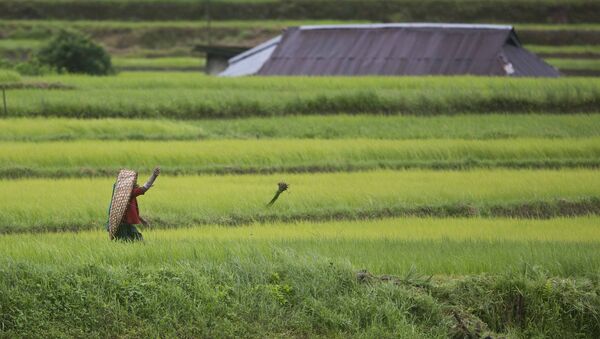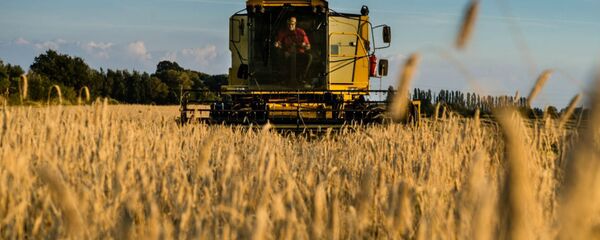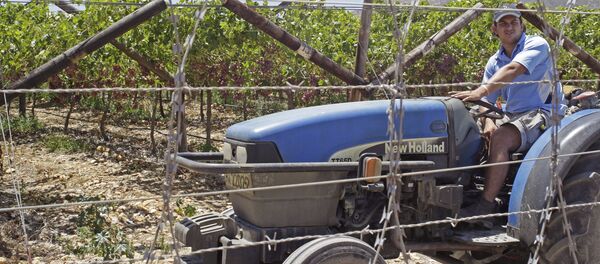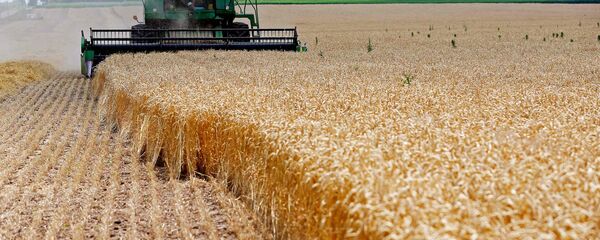New Delhi (Sputnik) — More than 30 percent of the organic producers in the world are from India, according to the latest edition of the World of Organic Agriculture report published by the reputed international organizations FiBL and IFOAM. The country has registered a significant increase in organic agricultural land and has reached among the top 10 countries with the largest areas of organic land.
The Indian government acknowledges that the international demand for Indian organic produce is high. Union Agriculture and Farmers Welfare Minister Radha Mohan Singh said at a recent organic farming convention that "[d]uring 2016-17, India produced 15 lakh tonne organic produce, wherein the export volume was 3.64 lakh tonne with value of Rs 2478 crore (372 million USD) whereas the domestic market size is estimated at Rs 2000 crore (300 million USD) which is expected to touch Rs 10000 crore (1.5 billion USD) in the next three years."
Sputnik spoke to Anupam Deb, director of Sudharma Krishi Consultants, a company that provides solutions in the agribusiness sector. Deb explains why most farmers don't find the organic route to be a financially viable option.
READ MORE: Goats vs Sanctions: Meet Russian Farmer Whose Herd Thrives Due to Restrictions
"When you want to start an organic farming project you'll have to wait at least three years to get certified. During this time period, you cannot sell your produce as organic. But you've to practice the protocol of organic farming. In most cases, the cost of organic farming is higher than traditional farming. This becomes a challenge because even though you are spending more you can't claim the premium that is associated with organic produce," Anupam Deb said.
Several other states in India have instituted organic farming policies. Kerala has already announced its intention to become a 100 percent organic state. In 2015, the Indian government launched the Paramparagat Krishi Vikas Yojana (PKVY) to promote organic farming, but most states have failed to utilize even 50 percent of the fund allocated to them under this scheme.
READ MORE: US-China Trade Tiff a Golden Opportunity for India — Minister
Agriculture experts reason that all the states of India have their own unique set of challenges due to differences in their agro-ecological zones. "Agriculture policy is a prerogative of state governments due to the versatility of geography and climate in India," Deb explains.
Even in Sikkim, several farmers have to struggle due to decreased output and insufficient know-how for dealing with pest attacks. Sputnik spoke to Udayan Arya, founder and director of Smur Agro Ventures, a company that produces organic farming inputs.
"We need a scientific approach to organically enhanced output. In order to compete with chemical-intensive commercial ventures, we need organic inputs that can give more output than chemical products. We've developed a process of intermittent nutrient supply to plants where high absorbent nutrients are sprayed according to their own crop-cycle. Even fungicides and pesticides are nutrient based. The cost factor is also important, some of our products are drastically cheaper than the chemical option. In India, the high cost of chemical inputs have forced farmers under huge debt," Udayan Arya said.
READ MORE: India, Pakistan Competing to Capture China’s Rice Market
"Most people are unaware of the differences between organic and inorganic farming. Even a lot of educated people don't know how to identify if a product is legally organic. Besides those who are aware of the health benefits and want to purchase organic food regularly are not residing in a concentrated area. This is a constraint in viable supply-chain management," Deb explains.
The international organic market has increased to 90 billion USD. Although the demand for organic food is concentrated in the US and Europe, this positive trend is bound to continue. The Indian domestic market is also growing slowly but steadily. The stakeholders in the country have expressed that organic is the way forward to protect the environment, sustain soil health and fertility, and achieve nutritional security.
The views and opinions expressed in this article are solely those of the speakers and do not necessarily reflect those of Sputnik.






